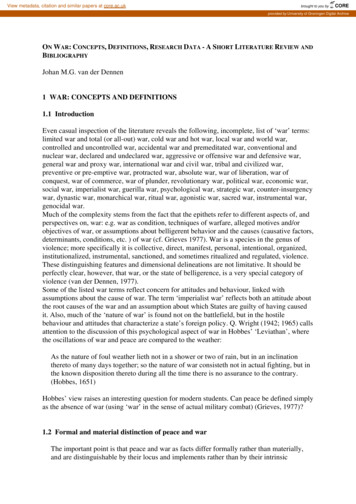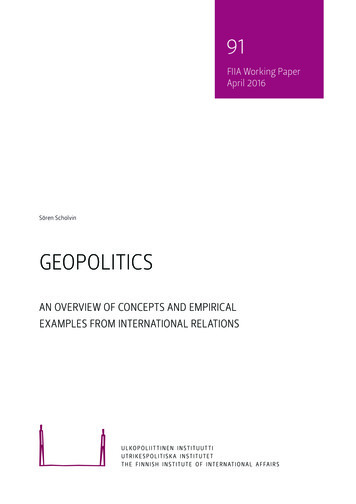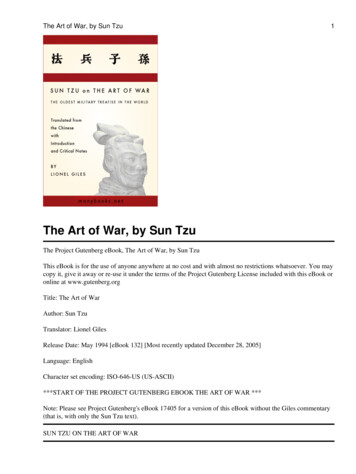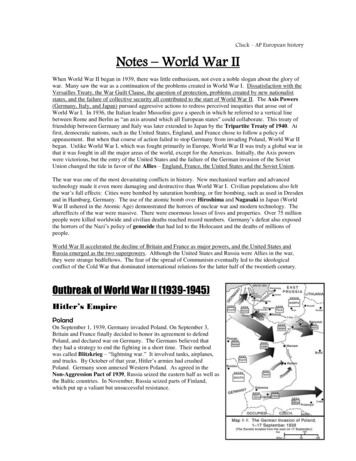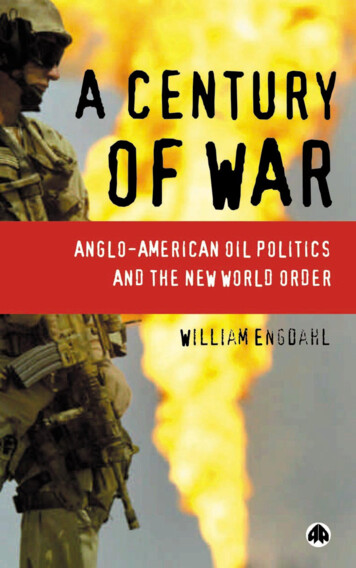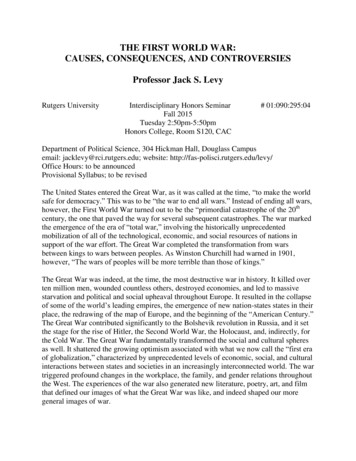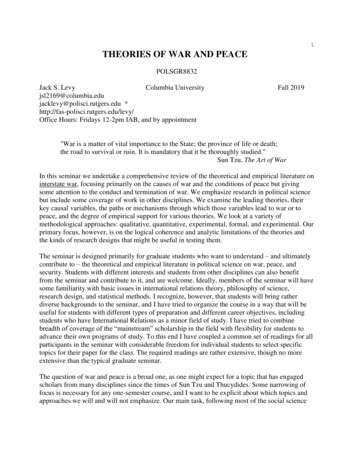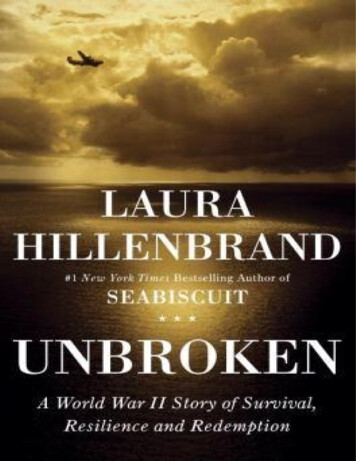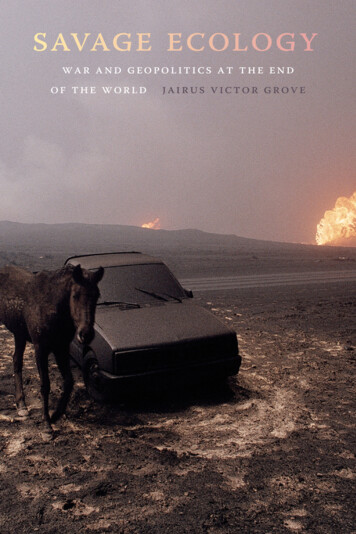
Transcription
Savage EcologyWar an d Ge o p o l i t i c s a t the E n dof t h e Wo rl dJa i ru s V ic to r G r o v e
savage ecol o gy
Savage Ecologywar a n d g e o p o l i ti c s at t h e e ndof th e wo rl dj a i ru s v ict o r g r o veDuke University Press— Durham and London— 2019
2019 Duke University PressAll rights reservedPrinted in the United States of Amer ic a on acid- free paper Designed by Courtney Leigh BakerTypeset in Warnock Pro by Westchester Publishing ServicesLibrary of Congress Cataloging-in-Publication DataNames: Grove, Jairus Victor, [date] author.Title: Savage ecology : war and geopolitics at the end of the world /Jairus Victor Grove.Description: Durham : Duke University Press, 2019. Includes bibliographical references and index.Identifiers: lccn 2018055115 (print) lccn 2019005433 (ebook) isbn 9781478005254 (ebook) isbn 9781478004219 (hardcover :alk. paper) isbn 9781478004844 (pbk. : alk. paper)Subjects: lcsh: War—Environmental aspects. Geopolitics—Environmental aspects. Political violence—Environmental aspects. Climatic changes—Effect of human beings on. War and society.Classification: lcc qh545.w26 (ebook) lcc qh545.w26 g76 2019(print) ddc 363.7—dc23lc record available at https://lccn.loc.gov/2018055115Duke University Press gratefully acknowledges the generous supportof the University of Hawai‘i at Manoa, which provided funds towardthe publication of this book.Cover art: Kuwait, 1991. Bruno Barbey/Magnum Photos.
O I see now, flashing, that this Amer ic a is only you and me,Its power, weapons, testimony, are you and me,Its crimes, lies, thefts, defections, slavery, are you and me,Its Congress is you and me— the officers, capitols, armies, ships, are you and me,Its endless gestations of new States are you and me,The war— that war so bloody and grim— the war I will henceforth forget— was you and me,Natu ral and artificial are you and me,Freedom, language, poems, employments, are you and me,Past, pre sent, future, are you and me. w alt whitman, “As I Sat Alone by Blue Ontario’s Shores”
contentsAcknowl edgments— ixIntroduction 100. Aphorisms for a New Realism— 29part i. the g reat homogenization1. The Anthropocene as a Geopo liti cal Fact— 352. War as a Form of Life— 593. From Exhaustion to Annihilation: A Martial Ecol ogy of the Eurocene— 79part ii. operational spaces4. Bombs: An Insurgency of Th ings— 1135. Blood: Vital Logistics— 1396. Brains: We Are Not Who We Are— 1597. Three Images of Transformation as Homogenization— 191part iii. must we persist to continue?8. Apocalypse as a Theory of Change— 2299. Freaks, or the Incipience of Other Forms of Life— 249Conclusion. Ratio feritas: From Critical Responsiveness to Making NewForms of Life— 273The End. Visions of Los Angeles, California, 2061— 281Notes— 285Bibliography— 317 Index—341
ackno w l e dg m en t sThis book w asn’t supposed to be written. That it was written means I ran upan incredible debt with mentors, friends, and f amily. Only now as a professorand advisor do I understand how much the labor given was beyond anythinglike professional responsibility and just how scarce the time was that manygave. I was a hard student, I strug gled, and any aptitude I had for this kindof work was not obvious. I benefited b ecause early on a few p eople took aninterest when most thought I was an annoyance and a waste of time. Beyondall the citations t hese folks get throughout the rest of the book, I want to saysomething about the debt I can never pay back, beginning with my mom.My mom watched me finish most school days in tears and then start mostdays physically sick with dread. Homework was impossible. Trying to recopy things from books felt like peeling the skin off my own face. Writing feltlike punishment. My mom got me through every assignment, wrote notesto rarely understanding teachers explaining why my homework was in herhandwriting, and waited out the most hostile of the teachers who felt inspired to convince me and my mom that I had no business being in school atall. Some insisted I would not finish high school. O thers just wanted to makesure I understood how truly lazy they thought I was. Before there was anAmericans with Disabilities Act, my mom fought for me to have access to acomputer, adequate time to finish assignments, and the basic re spect necessary to survive in the classroom. Before most teachers knew what a learningdisability was, long before we could say something affirmative like neurodiverse or my favorite, neuroqueer, my mom found someone who could teachme to physically write, almost spell, and at least learn to use some rudimentary grammar. When the prevailing wisdom was to put me on medi cation,she talked me through the side effects and let me choose not to pursue medi cation. She was a single mother who by her nature hated confrontation andyet she was a fierce advocate and a limitless emotional support so that I couldsurvive a school system designed for me to fail.
In addition to the hard stuff, my mom also cultivated in me a love for1940s screwball comedies and a devotion to Alfred Hitchcock, which proved,serendipitously, to be an invaluable background for the pursuit of philosophy. There were a few teachers along the way who made school worth showing up for: Mark Webber, my debate coach; Dorothy Blodgett, who inspiredmy love of history; and Jim Herman, who encouraged my curiosity for thebiological sciences: all helped get me through high school.In college, three amazing scholars refused to let me quit and pushed meto go to gradu ate school. All three suffered through my tortured writing andall three found ideas buried in the mess of my thinking that they convincedme I should pursue. Without all of them I would have never both ered applying to gradu ate school and without them I certainly would not have beenadmitted. They wrote recommendation letters for me, edited statements ofpurpose, and gave me stacks of books to challenge and inspire me. I was alot of work and they just kept showing up. Robin Kilson, Begoña Aretxaga,and Barbara Harlow pushed me hard and never gave up on me. Robin alsotaught me how to make sangria, talk to academics, and look the horrors ofour histories dead on, and she showed me what it looked like to strug gle witha debilitating disease on top of the cruelty of antiblackness and never give aninch. She wanted me to go to Harvard and she wanted me to be a historianbut she was quite happy the day I told her I was admitted to Hopkins. Shewas also skeptical of all the “theory” I liked but she would have read everypage of this book and argued with me about e very paragraph, chuckling atme and half- smiling through the w hole t hing. Barbara took me on as an advisee, despite the fact that I was a history major outside her department, andshe supervised my se nior thesis. She taught me how to read closely, tried toteach me how to write, and when I was convinced she hated me and thoughtI was an idiot, she told me that she wanted to write me a recommendationletter for gradu ate school. And in her sardonic, more serious than joking wayshe told me that I would be an idiot not to apply. Begoña encouraged meto take my first gradu ate class while I was still an undergrad at ut Austin.She introduced me to a wonderland of theorists and new ideas and then supervised my ma thesis at the University of Chicago while she was a visitingscholar there. I only entered that program because she insisted that I not stop going to school after I had been unable to accept an offer to Johns Hopkins because I needed to take a job in Chicago. She was an incredible scholar anda generous advisor and reader. Begonia understood the intimacy and creativehorror of vio lence better than anyone and had a nuance and reflexivity forthe ethical terrain of war that always left me in awe.x—Acknowl edgments
Despite all the labor t hese folks put in, I was no less work in my PhDprogram. Bill Connolly and Jane Bennett suffered through late papers, baddrafts, papers that w ere longer than novellas, and quite a few other challenges along the way. I owe them my degree, my career, and my love for po liti cal theory. They bought us our first stroller, or ga nized a summer dissertation defense, and were invaluable in getting me a job. They taught me howto run a seminar, how to teach and advise gradu ate students, and showedme a generosity in the nature of things that I still strug gle to hold on to butlook for nonetheless. When I showed up at my first conferences, there wasalways an advance team of their intellectual friends from Mike Shapiro toMort Schoolman to Tom Dumm to Bonnie Honig to Stephen White readyand willing to ask encouraging questions at nearly empty 8:00 a.m. panels.Without fail they were t here again at the end of the day to buy me a beer a ftermiddling pre sen ta tions. I am further indebted to Bonnie, who read and commented on the full manuscript.In the weird world of international relations, Daniel Deudney refused toever let me hide at a conference. Dan introduced me to e very single personwe passed in the hall at the International Studies Association (isa) conference. And every year a fter my graduation he made sure I was on a panel atthe isa even if it meant getting permission to have an extra chair at panelshe was invited to. Dan is one of the last truly big thinkers in internationalrelations (ir). In an age of hyperspecialization and hyperregionalization, hehas never apologized for his audacity to take on the po liti cal structure of theentire planet and even sometimes the entire cosmos. I w ill always look up tohim for that boldness and the intellect he commands to pursue it.Siba Grovogui treated me like f amily from the moment I arrived at JohnsHopkins. I learned as much in his office talking about his journey fromGuinea to Baltimore that brought him to Hopkins as I did in his seminars.More than anyone, he cultivated in equal parts a cutting disrespect for international relations and a commitment to its enterprise in hopes of a less cruelworld. Siba taught me to read the canon with new eyes and helped drag meacross the finish line of my PhD. After showing up in Hawai‘i, I had the privilege of attending Chuck Lawrence’s mentoring seminar for ju nior faculty. Chuck and Mari are real livesuperheroes still fighting injustice with an endurance that seems entirely unaffected by the darkness of our times. It was on their living room floor, tryingto absorb every thing that was being said by Chuck and Mari and activistscholars like Malia Akutagawa, Aaron Sala, and Kapua Sproat about what itmeant to live radical and often endangered lives, that I fi nally understood theAcknowl edgments—xi
difference between mere knowledge and wisdom. What I came to understandwas how little of the latter I possessed. It was a humbling experience forwhich I am very grateful.Thanks to Nandita Sharma and Gaye Chan, who remind me over and overto do something with my po liti cal discontent. They are a source of inspirationfor how to lead a righ teous, artistic, and meaningful life all in equal mea sure.Without qualification, my department has supported and mentored myresearch and teaching e very step of the way. Kathy Ferguson has led our department and been a constant source of support since my arrival. MichaelShapiro, Jon Goldberg- Hiller, Sankaran Krishna, and Debbie Halbert haveread many drafts, inspired ideas, and counseled me through career decisions, life decisions, po liti cal defeats, and every thing in- between. Thankyou to Noelani Goodyear- Ka‘opua and Noenoe Silva, who have also taughtme a g reat deal about how to be a scholar but who have also patiently andgraciously helped me understand what it means to be a scholar in Hawai‘i.Thanks to them, I w ill never take for granted t hose who bear the greatestcosts of my occupation of these islands. I look forward to the day when I canleave, apply for a work visa, and return to an in de pen dent Hawai‘i, if they willhave me back. Nevi Soguk, Carolyn Stephenson, Dick Chadwick, ManfredHenningson, Katharina Heyer, and Larry Nitz all generously gave me theirtime, advice, and support. Th ese se nior colleagues have never once pulledrank or made me feel like I was anything other than their colleagues. Thatis a rare privilege for a ju nior scholar and I cannot imagine the departmentwithout any of them. I am also indebted to Laurie Onizuka, whose virtuosityas a departmental administrator I call on e very single day. Laurie is a g reatfriend and colleague.Thanks to Team War, which helps keep fun alive in the insanity of ourweird field. Antoine Bousquet and Nisha Shah are the finest of interlocutorsand great friends.Many of the ideas in this book have been shaped by the incredible gradu ate students I have the privilege to work with. The yearlong CyberneticsReading Group with Katie Brennan, Rex Troumbly, and Guanpei Ming wasinstrumental to this book and the next book. We are more than three yearsinto the Phenomenological Reading Group for Useless Theory thanks to thecommitment and brilliance of Aaron Cornelison, Jonathan Hui, Sophie Kim,Ryan Koch, and Amy Sojot. I cannot wait to read all your gestating books.Thank you to Gitte du Plessis, who not only read the entire manuscriptbut had feedback on all of it. Thank you to Ken Gofigan Kuper, who inspiresme to see possibilities for worlds that can fight back against the Eurocene. Ixii—Acknowl edgments
hope Ken will hire me as a national security advisor when Guahan becomesin de pen dent.And thank you to all the gradu ate students who trusted me enough to putme on their committees. I have benefited so much from your work: SammyBadran, Katie Brennan, Michelle Brown, Duyen Bui, Anna Butcheret, Jonathan Dial, Heather Frey, Brian Gordon, Julia Guimares, Jon HuiKeonwooKim, Sean Hyoun Kim, Christopher Klein, Ryan Koch, Ken Gofigan Kuper,Ashley Lukens, Matt Markman, Micheal Miller, Guanpei Ming, YoungwooMoon, Ali Musleh, Sharain Naylor, Emily Pesicka, fx Plasse- Coutre, PhilReynolds, Benton Rodden, Aaron Rosa, Jacob Satoriadis, Ben Schrader, TaniSebro, Riddih Shah, Owen Sheih, Yujing Shentu, Amy Sojot, Zoe Vorsino,Irmak Yazici, and Aubrey Yee.In gradu ate school I benefited from an amazing extended cohort of scholars. Almost every weekend, we found ourselves in a backyard cooking, debating, thinking, and watching an illicit firepit burn down to coals. So manyideas took place in Jake Greear’s shed that would later find their place in these pages. I miss being bested repeatedly in open combat by Jake Greear,Jeremy Arnold, Mabel Wong, Simon Glezos, Hadley Leach, Rob Higney,Cristie Ellis, Daniel Levine, Michael McCarthy, Chas Philips, Adam Culver,Daniela Ginsberg, Brighu Sing, Alex Lefbevre, and Alex Barder.Thanks to James Der Derian, a mentor, a true friend, and the person I wouldwant at my back in any kind of fight. Thanks to Mark Salter, who pulled meout of the deep end at my first academic event as an assistant professor andhas been my friend ever since. Thanks to Debbie Lisle, whose limitless energy and intellectual force keep kicking ir in the teeth all the while beinghilarious.Thank you to David Weil for the insane six weeks on the campaign trail incentral Florida. While I will never be a mea sured thinker, David w ill alwaysremind me of its virtue.And this w ill quickly become a book unto itself. The following have beensignificant inspirations and friends at panels, at home, and over the weird intellectual community of blogs and Facebook: Shain Raily, Iris Marion Young,Rohan Kalyan, Heather Johnson, John Protevi, Lauren Berlant, Jonathan Lear,MacKenzie Wark, Miguel de Larrinaga, Megan Mackenzie, Roland Bleiker,Grace Ho, Anand Pandian, Naveeda Kahn, Peter Skafish, Laura Shephard,Patricia Owens, Cynthia Weber, Sam Opondo, Noah Viernes, Dan Monk, Lester Spence, Sam Chambers, Tim Morton, Lisa Disch, Alan Finlayson, DavidHowarth, Lori Marso, Michael Hanchard, Rom Coles, Daniel Smith, AlettaNorvall, Jennifer Culbert, Mary Tuti Baker, Lida Maxwell, Colin Wight, AlexAcknowl edgments—xiii
Wendt, Ben Mieches, Claudia Aradau, Dan Nexon, Levi Bryant, David Panagia, Kam Shapiro, Terrell Carver, Lida Maxwell, Lisa Disch, Helen Kinsella,Jeff Vandermeer, Kevin Kenny, Veena Das, Paola Marrati, Can Mutlu, AdamSandor, Jeff Hussyman, João Nogueira, Tony Burke, Audra Mitchell, Ron Deibert, Victor Coutinho Lage, Carlos Braga, Natália Félix de Souza, and AaronGoodfellow.And thanks to the debaters who taught me how to think before I couldwrite: Asher Haig, Tristan Morales, Varant Yegparian, Kevin Kuswa, SarahApel, David Michael Mullins, Ralph Paone, Kirk Evans, Dallas Perkins, Lindsay Harrison, Sherry Hall, Matt Zamias, Bill Russell, Roger Solt, Scott “Duck”Deatherage, Ross Smith, Chris MacIntosh, Jessica Clark, Michael Horo witz,Jon Paul Lupo, Edmund Zagorin, Brian McBride, Stap Beaton, Jonathan McCartney, Loe Hornbuckle, Jon Brody, Leslie Wexler, Matt Powers, AndrewLeong, Dayvon Love, Eli Anders, Eli Jacobs, Michael Klinger, Elliot Tarlov,Michael Gottlieb, Claire McKinney, Joel Rollins, Mark Webber, Nick Copeland, Karla Leeper, Jason Russell, W ill Repko, Biza Repko, Colin Kahl, BrettGriffin, Loren Dent, Anjali Vats, Dan Luxemburg, John Fritch, Chris Lundberg, and Aimi Hamraie.Special thanks to Courtney Berger for being an amazing editor and SandraKorn for all her hard work in getting the manuscript into publishable condition. I also want to thank Susan Albury for supervising and directing all ofthe complexity of making the manuscript into a book. Also thank you to theanonymous reviewers, who helped make the manuscript a much better book.Thank you to friends who are truly more like f amily: Jonathan Scolnick,Ricky Garner, Laura Nathan, Anthony Miller, Adrian and Caitlin Ramirez,Paul Boston, and my last debate coach, Joel Rollins.Thank you to my uncle Donn, who made sure I had the Huck Finn childhood every kid should have, and to June and Pa for being the shelter andsupport my mom and I needed. Thank you to Grandpa Jim for long talks ona roof in Manzanillo, Mexico, a fter dark watching the bats and talking to meabout the mysteries of the universe. You introduced me to William Jamesand inspired the curiosity to follow questions wherever they lead, even intothe darkness. Thanks to my grand mother Beverly, who made me get out theunabridged dictionary every time I asked how to spell a word.Thank you to my sister and brothers, Zelda, Jonas, and Sean. Being anonly child until I was sixteen was lonely and quiet. You all make the worldmore fun.Gratitude doesn’t conceptually capture the essential necessity of NicoleGrove, my partner in ideas and my partner in life, in all this. We have travxiv—Acknowl edgments
eled to just about every corner of the earth, trying to think, research, write,and survive with our c hildren, Oona Tuesday Grove and Scout Ellison Grove,in tow. I cannot imagine doing any of this without you. Nicole is responsiblefor the best of me and is the scholar I look up to most. She has barely takenan extra breath while continuously making degrees, dissertations, children,articles, books, and our f amily. I will always be in awe of your fierce and unstoppable pursuit of life. You are our vampire slayer and the legacy in whosepath our daughters will follow. To Oona and Scout, every day, I look forwardto seeing the new worlds you will make.a section of the introduction appeared in “Ecology as Critical SecurityMethod,” Critical Studies on Security 2, no. 3 (2014): 366–69. An earlier section of chapter 1 appeared in “The Geopolitics for Extinction,” in Technology and World Politics: An Introduction, edited by Daniel McCarthy (NewYork: Routledge, 2017). An earlier version of chapter 4 appeared as “An Insurgency of Things: Foray into the World of Improvised Explosive Devices,”International Political Sociology 10, no. 4 (2016): 332–51. An earlier versionof chapter 5 appeared in “The Geopolitics of Blood,” in Making Things International, edited by Mark Salter, 184–200 (Minneapolis: University ofMinnesota Press, 2015). Part of chapter 6 appeared as “Something DarklyThis Way Comes: The Horror of Plasticity in the Age of Control,” in PlasticMaterialities: Politics, Legality, and Metamorphosis in the Work of CatherineMalabou, edited by Brenna Bhandar and Jonathan Goldberg-Hiller, 233–63(Durham, NC: Duke University Press, 2014). An earlier version of part ofchapter 8 appeared as “Must We Persist to Continue? Critical Responsiveness beyond the Limits of the Human Species,” in Democracy and Pluralism,edited by Allen Finlayson, 183–202 (New York: Routledge, 2009).An earlierversion of chapter 9 appeared as “Of an Apocalyptic Tone Recently Adoptedin Everything: The Anthropocene or Peak Humanity?” Theory and Event 18,no. 3 (2015), https://muse.jhu.edu/, accessed December 16, 2018.Acknowl edgments—xv
I ntroducti onThe truly apocalyptic view of the world is that t hings do not repeat themselves.It isn’t absurd, e.g., to believe that the age of science and technology is thebeginning of the end for humanity; that the idea of g reat pro gress is a delusion, alongwith the idea that the truth will ultimately be known; that t here is nothing goodor desirable about scientific knowledge and that mankind, in seeking it, is fallinginto a trap. It is by no means obvious that this is not how t hings are.—ludwig wittgenstein, Culture and ValueIn 1992 the Union of Concerned Scientists issued a warning to humanity. According to the union, the current trajectory of development promised “vast human misery . . . and a planet . . . irretrievably mutilated.”1 At this time, thecritical areas of concern were the atmosphere, water resources, oceans, soil,forests, living species, and the size of the human population. Each of theseareas was identified as a necessary precondition for h uman survival, with1,575 scientists joining the public statement. The warning was followed bya set of recommendations said to be within the grasp of all populations ofthe world: a significant reduction in the destruction of natu ral resources,sustainable resource management, population stabilization through voluntary family planning, reduction and then elimination of poverty, and sexualequality such that w omen could determine their own reproductive decisions. To accomplish t hese goals, the u nion insisted that investment in andoccurrence of vio lence and war needed to be reduced in order to f ree up thenecessary resources for saving the species. The report estimated that US 1trillion annually was being directed to the preparation and prosecution ofwarfare. The starkness of the choice is itself in ter est ing. For the union, in aworld of finite resources the species had to choose between war and survival,but it could not choose both.Twenty- five years l ater, the warning was issued again, and 15,364 scientistsjoined the “second notice” to humanity.2 The group, now renamed Allianceof World Scientists ( unions and concerns having fallen out of po liti cal favor),
found unequivocally that the state of the world is worse than we thought in1992, and that little if any pro gress has been made in the intervening years.While no official answer to the 1992 warning was issued, a decision wasmade. Those in a position to make a decision chose war.It is not unusual that more than fifteen thousand scientists would agreeon something. I imagine millions of scientists agree on other questions, likethe basic nature of gravity and the atomic weight of cobalt. Yet it is difficultto imagine the need or interest to issue a public statement about t hese meredescriptions of fact. What makes this concern worthy of a public address isthat the statements issued in 1992 and 2017 are attempts to make a claim ona public, in fact the public: the global whole of the human species. The toneof both letters invests the full force of collective scientific expertise, argumentmaking, and powers of persuasion on the case to be made for a threat to theplanet. The letters simply assume that if the case is successfully made thathumanity faces impending doom, the case for saving humanity will automatically follow as if by some mechanism of logical necessity. Unfortunately, thisassumption is not merely off the mark. Global politics for the past five hundred years is proof of the opposite of common sense. Th ere is a centuries- longinvestment in research, development, and deployment of techniques to ensure that survival is only ever a right for some. This right for some, more oftenthan not, is ensured at the expense of the self- determination and continuationof living for the overwhelming majority of the planet’s h uman population.Against the banal appeal to a universal humanity or the equally commonplace and catastrophic insistence on an inevitable clash of civilizations, I prefer the idea of “form of life.” Not quite race and more than culture or style, thisphrase refers to those ways of being in the world— always lived collectively— without which one would no longer be who or what one is. I want to go further than Ludwig Wittgenstein’s invocation of form of life as one’s par tic u lar game of language and gesture— the physiognomy that for him makes one human— into the ways that not just h umans but all t hings creatively striving toward complexity come to make worlds out of their intractable dependenceon and contribution to an environment.3 And beyond Wittgenstein’s eventsof communicative failure, interruptions of these relations and habits threatenexistence itself. When efforts are made to wipe out the American bison andbuffalo or to militarize borders to interrupt the flow of mi grants who followseasons and crops, it is not just a habit or practice that changes. The interrup eople and frequently cascades into genocides andtion of a form of life kills pextinctions. In the case of the buffalo, it was not just the bands and nationsof the Great Plains whose precarity was leveraged for the strategic goal of2—Introduction
genocide and settlement. The entire prairie ecosystem was targeted, movingon from human inhabitants to predators such as wolves and big cats to makeway for leisure hunting and grazing practices that created the dust bowl andthe subsequent collapse of riparian habitats throughout the United States.4I take inspiration from Giorgio Agamben’s more radical reading of Wittgenstein’s form of life in my desire to describe lives that cannot survive beingseparated from the way they are lived, but like Wittgenstein’s linguistic provincialism, I do not accept Agamben’s species provincialism that form of life either is what defines the human or is exclusively a human attribute.5 Quite theopposite, when form of life is seen ecologically, what becomes apparent is howmany dif fer ent species, practices, histories, cosmologies, habitats, and relations come to constitute what we might call a form of life. Form of life is a par tic u lar origami in the “fabric of immanent relations” that defines the torsionbetween the singularity and the interpenetrated relationality of each and every human and nonhuman person.6 This question will be taken up more substantially in chapter 1, but suffice it to say that form of life, for me, is the currentor flow against which we can even identify a change or intervention as violentrather than merely as a change. And geopolitics, the focus of all the followingchapters and that which the concerned scientists want to avoid, is the collectively practiced art and science of that vio lence against other forms of life.In fact, it is this very geopolitics— nation- states making decisions andwielding power at a global scale— that the scientists want to steer away fromwar t oward saving the planet, which is not premised at some foundationallevel on a general princi ple of order or the good. Geopolitics is, at its mostfundamental level, a husbandry of global life in which thriving is intimatelyconnected to the par tic u lar form of life and the par tic ul ar lifeworld throughwhich one becomes who one is. Geopolitics is structured to be selective, andto ensure that selectivity by lethal force.Therefore, to oppose survival to the pursuit of war as a global questionfor a global audience (as if that audience w ere empowered or even capable ofissuing a global answer) displays a per sis tent and willful naïveté of how theglobal was made in the first place. The geopo liti cal proj ect of planet Earth isa violent pursuit of a form of life at the cost of others— full stop. However,at the same time, with an often zero- sum game over form of life at its center, global war— the presumed opposite of h uman survival—is not primarily about direct killing. Instead, the vio lence of geopolitics is an ecologicalprinci ple of world making that renders some forms of life princi ple and otherforms of life useful or inconsequential. Emmanuel Levinas is quite helpfulon this point. In his investigation of the antinomy between philosophy andIntroduction—3
war, Levinas came to understand the vio lence of geopolitics and its pursuitof global war to be less a direct material force and more an orga nizationalprinci ple of coercive steering and depriving: “Vio lence does not consist somuch in injuring and annihilating persons as in interrupting their continuity, making them play roles in which they no longer recognize themselves,making them betray not only commitments but their own substance, makingthem carry out action that will destroy e very possibility for action.”7The attack on the conditions of life and its formation as a form of life establishes more than a trade-off between the material costs of warfare and thepursuit of the Union of Scientists for planetwide and environmentally sustainable economic and sexual equality. Geopolitics, enacted through globalwar, is itself a form of life that pursues a sa
Title: Savage ecology : war and geopolitics at the end of the world / Jairus Victor Grove. Description: Durham : Duke University Press, 2019. Includes bibliographical references and index. Identifiers: lccn 2018055115 (print) lccn 2019005433 (ebook) isbn 9781478005254 (

